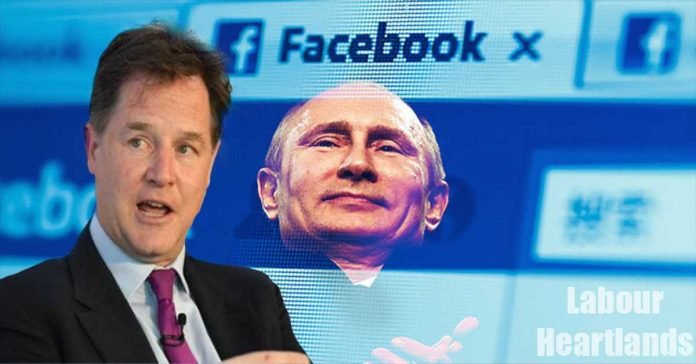Facebook: Nick Clegg says ‘no evidence’ of Russian interference in Brexit vote
There is “absolutely no evidence” Russia influenced the Brexit result using Facebook, the company’s vice-president, Sir Nick Clegg, has said.
The former deputy PM told the BBC the company had carried out analyses of its data and found no “significant attempt” by outside forces to sway the vote.
Instead, he argued that “the roots to British euroscepticism go very deep”.
the roots to British euroscepticism go very deep.
Clegg admitted he is a passionate remainer and wanted the results to go the other way.
‘Remainer Conspiracy to undermine democracy’
In the interview, Sir Nick dismissed claims that data analytics firm Cambridge Analytica influenced people’s decision to vote Leave in the EU referendum in 2016.
“Much though I understand why people want to sort of reduce that eruption in British politics to some kind of plot or conspiracy – or some use of new social media through opaque means – I’m afraid the roots to British Euroscepticism go very, very deep,” he said.
Instead, he argued attitudes had been influenced far more by “traditional media” over the last 40 years than by new media.
[vc_video link=”https://youtu.be/fK9MbOawRHQ” align=”center”]
In a wide-ranging interview, Sir Nick also called for more regulation of Facebook and other tech giants.
Sir Nick, the former leader of the Liberal Democrats and deputy prime minister during the coalition government, was hired by Facebook in October last year.
Can Nick Clegg help Facebook grow up?
Regulate Facebook now, say UK MPs
In an interview with BBC Radio 4’s Today programme, he said Facebook was now arguing for greater regulation of tech firms.
He said there was a “pressing need” for new “rules of the road” on privacy, election rules, the use of people’s data and adjudicating on what constitutes hate speech.
It follows growing criticism of the tech giant and calls from MPs for far stricter regulation over issues including fake news, harmful content and the way user data is used.
Asked whether Facebook should not be fixing some of these issues itself, Sir Nick said it was not something big tech companies “can or should” do on their own.
“It’s not for private companies, however big or small, to come up with those rules. It is for democratic politicians in the democratic world to do so,” he said.
But he stressed companies like Facebook should play a “mature role” in advocating – rather than shunning – regulation.
#Peoplesvote
Support Independent Journalism Today
Our unwavering dedication is to provide you with unbiased news, diverse perspectives, and insightful opinions. We're on a mission to ensure that those in positions of power are held accountable for their actions, but we can't do it alone. Labour Heartlands is primarily funded by me, Paul Knaggs, and by the generous contributions of readers like you. Your donations keep us going and help us uphold the principles of independent journalism. Join us in our quest for truth, transparency, and accountability – donate today and be a part of our mission!
Like everyone else, we're facing challenges, and we need your help to stay online and continue providing crucial journalism. Every contribution, no matter how small, goes a long way in helping us thrive. By becoming one of our donors, you become a vital part of our mission to uncover the truth and uphold the values of democracy.
While we maintain our independence from political affiliations, we stand united against corruption, injustice, and the erosion of free speech, truth, and democracy. We believe in the power of accurate information in a democracy, and we consider facts non-negotiable.
Your support, no matter the amount, can make a significant impact. Together, we can make a difference and continue our journey toward a more informed and just society.
Thank you for supporting Labour Heartlands









